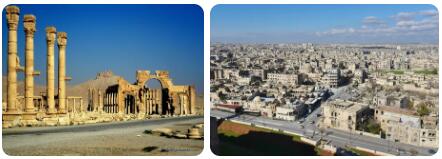Syria: entry and exit regulations
Formalities, visas
There is a visa requirement. A passport or child ID card that is valid for at least six months is also required for entry.
In general, a four-week stay is granted. An application for an extension must be made to the Syrian immigration authorities after four weeks.
Tourists whose passport has an Israeli stamp on it will be refused entry even if they have a visa. This also applies to passports with stamps from Israeli-Egyptian or Israeli-Jordanian border crossings.
The following is responsible for issuing visas in Germany:
Embassy of the Syrian Arab Republic
Rauchstrasse 25
10787 Berlin
Tel: 0049 – (0) 30 – 50 17 70
Fax: 0049 – (0) 30 50 17 73 11
www.syrianembassy.de
Import and export of foreign currency
- Local currencyThe import of the Syrian pound is unlimited, the export of the Syrian pound with a value of more than 100 US dollars is not permitted.
- Foreign currenciesAmounts in excess of US $ 5,000 must be declared.
The exchange of foreign currencies for the Syrian pound outside official exchange offices, i.e. “black” exchange, is of course strictly forbidden.
Import and export of goods
The import and export of drugs, weapons, explosives and media with pornographic content is strictly prohibited. The import of electronic devices is subject to approval; authorization must be requested in advance from the embassy of the Syrian Arab Republic; a processing time of several weeks should be planned. The export of antiques can be problematic and should be discussed with the customs authorities beforehand.
Entry with pets
For the owners of dogs and other animals, when traveling abroad, the question arises whether they can even take their animals with them to the chosen travel destination, and if that is possible, then of course the question of the respective applicable conditions arises. Here with us you will find all the important information on this topic, seriously researched by the embassies, the Foreign Office or the ADAC.
The import of birds is generally prohibited.
For the importation of other pets, an official health certificate is required, which confirms that the animal is free from infectious diseases and contains information on age, color, breed, gender and the name of the owner and the animal. All pets must also be vaccinated against rabies. This vaccination must be documented in an additional vaccination certificate.
Pets in the airplane
When transporting pets in airplanes there is the possibility that the animal flies together with an accompanying person (owner) or without such a person.
Animal transport with an accompanying person (owner)
In this case, proceed as follows: At the airport, the animal is locked in a transport crate previously obtained by the owner. It must be ensured that the container is large enough that the animal can stand in it and turn around, and it must also be ensured that no liquids can run out (urine). This is done using suitable absorbent material, in the simplest case using a sufficient amount of newspaper. There should also be a water bowl and, depending on the length of the flight, enough food. The transport container is handed over to the staff at the check-in counter. The transport fee depends on the weight of the animal. It is essential to ensure that there is space for the animal for the flight booked, as the number of animals that can be transported
The animal is located in the machine in an air-conditioned area between the passenger deck and the cargo area. As a rule, no member of the crew takes care of the animal during the flight, not even to give water or food. However, experience has shown that the stress of checking in and the take-off phase is so stressful for most animals that they sleep for most of the flight. The administration of sedatives before check-in is not only not recommended, as their effects cannot be foreseen under these conditions, but is even prohibited for reasons of security (smuggling). Many airlines also exclude a number of dogs (attack dogs) from transport.
Animal transport without an accompanying person
In this case, a specialist company must be commissioned with the transport, which then takes care of everything else. However, it should be ensured that the animal is picked up at the arrival airport by someone who is familiar to the dog. And of course all import regulations for pets for the country have to be explored beforehand and strictly adhered to.
Note
It has proven to be very helpful if you have accustomed the animal to such a transport container at home a few weeks before the intended flight.
Syria: arrival and transport
How do you get to Syria?
As a rule, you travel to Syria by plane, but you can also reach Syria by car, bus, train and ship.
Air connections
Damascus International Airport, approx. 25 km southeast of the city, is served by a number of international airlines. Syria’s national airline Syrian Arab Airlines offers flights to almost all European capitals, including flights to and from Berlin and Frankfurt/M. The flight time from Germany is approx. 4.5 hours. From the airport you can reach your next destination by taxi or by bus; however, these are only labeled in Arabic, so choosing the right bus may be a matter of luck.
There is another international airport in Aleppo, 10 km from the city. Buses and taxis go from there to the city center.
Ferry connections
There is shipping from Bodrum (Turkey) (car ferry) and with Louis Cruise Lines (www.louiscruises.com) from Limassol/Cyprus.
Rail connections
The famous Taurus Express runs once a week from Istanbul’s Haydarpasa train station to Aleppo (almost 1,400 km). A one-way ticket costs around $ 50 (sleeper). Syrian Railways trains continue from Aleppo to Damascus. Trains run twice a week between Amman (Jordan) and Damascus.
Entry by car
Entry is best via Istanbul, Ankara and Iskeneran. Continue via Bab-al-Hawa towards Aleppo or via Kassab to Latakia. Another good road connection is from Aqaba (Jordan). Import permits for vehicles are available from ADAC or AvD, for example. An international driver’s license, vehicle registration document and proof of liability insurance valid for Syria must be carried. The import of diesel vehicles requires a special permit (subject to a fee). Usually you get this on entry; To be on the safe side, however, detailed information should be obtained from one of the automobile clubs beforehand.
Travel in the country
Air traffic
Domestic air traffic is available with the Syrian airline between Damascus and Aleppo, Palmyra, Deir ez-Zor, Al-Qamishlye and Latakia.
Railway
trains run between Damascus, Aleppo, Kamachli, Lattakia, Banias, Tartous, Homs and Deraa. There are two daily connections between Aleppo and Damascus as well as a night train with a sleeping car. The journey takes about 4.5 hours; a 1st class ticket costs around US $ 3.
A historic steam train takes you from the Hejaz train station in Damascus up to Zabadani in the Anti-Lebanon Mountains.
Bus
Taxis, service taxis and regular buses run within the cities and between the individual cities. For taxi rides you should negotiate the price beforehand.
Streets
The road network is well developed, most of the roads are paved. Damascus, Horns, Hama, Lattakia, Tartus, Aleppo and Dar’a are connected by four-lane highways. The most important connection leads from Aleppo to Damascus and Dar’a.
Rental
cars Rental cars are available from popular providers as well as from small private companies. Prices start at around 40 US dollars per day, including unlimited mileage and insurance. Gasoline is relatively cheap in the country.
Traffic
rules Right-hand traffic prevails in Syria.
The maximum permitted speedwithin built-up areas is 40 km/h. However, this fact is ignored as well as the road markings. From a Central European perspective, Syrian driving behavior is decidedly anarchistic; Caution is therefore advised.
International license plate
The international license plate of Syria is:
| SY |
Syria: Travel Medicine, Vaccinations and Warnings
International health and repatriation insurance is strongly recommended.
Infectious Diseases
In Syria, the following infectious diseases are to be expected that are not or less common in Germany or Central and Northern Europe:
- MalariaThere is a low risk of infection in the northern border areas, and especially in the northeast of the country. Only the less dangerous malaria tertiana occurs there.
- Schistosomiasis/SchistosomiasisInfection possible, so bathing and swimming in inland waters should be avoided. Drinking fresh water, for example from streams or lakes, would be grossly negligent.
- DiphtheriaVaccination is recommended; but regardless of the trip to Syria everyone should be vaccinated anyway.
- Hepatitis AVaccination is recommended; but regardless of the trip to Syria everyone should be vaccinated anyway.
- Hepatitis BRecommended for longer stays and intensive contact with the local population.
- Kala AzarOccurs in the northwest of the country.
- Polio, poliovaccination recommended; regardless of the trip to Syria everyone should be vaccinated anyway.
- LeishmaniasisAn infection must be expected.
- Gastrointestinal InfectionsDrinking water, undercooked food, ice cream, unpeeled fruits, and raw vegetables can cause gastrointestinal infections. To be on the safe side, you should also use previously boiled water or commercially available bottled water to brush your teeth.
- TetanusVaccination is recommended; but regardless of the trip to Syria everyone should be vaccinated anyway.
- Rabiesoccurs; Vaccination is recommended for people who come into contact with potential vector animals, for example in the country, when hunting etc. Any contact with stray dogs and cats should be avoided
- Typhoidvaccination is recommended.
Malaria prophylaxis
There is a low risk in the northern border areas, especially from May to October. Long-sleeved clothing, mosquito repellants, mosquito nets, etc. are considered sufficient for protection. Chemical malaria prophylaxis is not necessary in this area either.
Compulsory vaccination
For all persons older than one year and coming from a yellow fever infection area designated by the WHO, there is a compulsory vaccination against an illness with yellow fever.
Who pays for vaccinations in Germany?
Most children in Germany are vaccinated against a number of infectious diseases at an early age. However, the vaccination protection only lasts up to 10 years, in some cases even shorter.
The costs for the following vaccinations should therefore be reimbursed by most statutory health insurances since June 2007.
There is even no 10 € practice fee – but the insured usually have to pay the statutory additional payment, which is 10% of the vaccine price – that is at least 5 € and a maximum of 10 €. Under these conditions, the following vaccinations are free of charge:
- cholera
- diphtheria
- Early summer meningoencephalitis (TBE)
- Yellow fever
- Hepatitis A and B
- Meningococcal meningitis
- Pneumococci
- Polyo (polio)
- Tetanus (tetanus)
- rabies
- typhus
Some health insurance companies also reimburse the cost of malaria prophylaxis. As a rule, private health insurance companies (inquire beforehand) also cover the costs mentioned.
Current warnings
At this address you can get current information on the risk situation in Syria – and also on other countries.
Foreign Office of the Federal Republic of Germany
Citizens’ Service
Phone: 0049 – (0) 30 – 5000 – 2000
Fax: 0049 – (0) 30 – 5000 – 51000
www.auswaertiges-amt.de
Tourist Information
Unfortunately, the website of the Syria Tourism Authority is not available in German – but in English and French.
Ministry of Tourism
Barada Street
Damascus
Syria
PO Box: 6642
Tel: 00963 – 11 – 2210122
Fax: 00963 – 11 – 2242636
E-mail: min-tourism@mail.sy
www.syriatourism.org
Syria: currency, shopping and exchange rate
The national currency of Syria is the Syrian pound.
The following banknotes are valid and in circulation in the country:
- 5
- 10
- 25th
- 50
- 100
- 500
- 1,000 SYP
Exchange rate
You can find a currency converter here: www3.forium.de
Bank opening hours
Saturday to Thursday: 8:30 a.m. to 2:00 p.m.
Shop
Shop opening times
The shop opening times are not uniformly regulated. Many shops are also open beyond the following times. Saturday to Thursday in winter: 8 a.m. to 1 p.m. and 4 p.m. to 7 p.m., in winter until 9 p.m. in summer. The shops in the souks often don’t open until 10:00 in the morning and are therefore open longer in the evening. The official day of rest is Friday.
Cheap or country-specific goods, souvenirs
Wooden objects with mother-of-pearl inlays (e.g. furniture, trays, boxes, backgammon games), damask, hand-embroidered tablecloths and serviettes, nuts, spices, candied fruits, carpets, water pipes, copper and brass goods, gold and silver jewelry, Arabic instruments. The famous Aleppo soap (olive oil soap) is the cheapest and best choice in the Aleppo souk. There you can also find beautiful silk fabrics.
Syria: embassies and consulates
Representations of Syria in Germany
The embassy of the Syrian Arab Republic is located in a restored old building from 1912. The building gives an indication of what the Tiergarten district looked like 70 years ago. The embassy is directly opposite the “Felleshus” the community house of the embassies of the “Nordic countries” – Denmark, Finland, Iceland, Norway and Sweden
Embassy of the Syrian Arab Republic in Berlin
Rauchstrasse 25
10787 Berlin
Tel: 0049 – (0) 30 – 50 17 70
Fax: 0049 – (0) 30 – 50 17 73 11
Web: www.syrianembassy.de
info@syrianembassy.de
Honorary Consulate of the Syrian Arab Republic
Brooktor 11
20457 Hamburg
Tel: 0049 – (0) 40 – 32 18 61
Fax: 0049 – (0) 40 – 32 70 86
German representations in Syria
Embassy of the Federal Republic of Germany in Damascus
Abdulmunem Al-Riad Street and Ebla Street, Malki
Damascus
Tel: 00963-11-37 90 00 00
Fax: 00963-11-33 23 812
Email: info@damaskus.diplo.de
Web: www.damascus.diplo.de/de/Startseite.html
Honorary Consulate of the Federal Republic of Germany in Aleppo
Abi Firas Al-Hamadani Street, Sebil
Aleppo
Tel: 00963 – 21 – 228 04 07
Fax: 00963 – 21 – 268 34 33
E-Mail: kkaleppo@antaki.cc
Austrian representations in Syria
Austrian Embassy in Damascus
Farabi Street 1, Bld. Mohamed Naim Al-Deker, Mezzeh, East Villas
POBox 5634, Damascus
Tel: 00963 – 11 – 613 80 1-00
00963 – 11 – 613 98 300
Fax: 00963 – 11 – 611 67 34
E-Mail: damaskus-ob @ bmeia.gv.at
Honorary Consulate in Alepo
Rue Baron, Jesuite Bld.
POBox 521, Aleppo
Tel: 00963 – 21 – 211 40 70
00963 – 21 – 211 40 71
00963 – 21 – 211 40 73
Fax: 00963 – 21 – 211 40 74
E-Mail: righi@net.sy
umberto.draghi@skynet.be
Representations of Syria in Austria
Embassy of the Syrian Arab Republic in Vienna
Daffingerstraße 4
1030 Vienna
Tel: 0043 – (0) 1 – 533 46 33
Fax: 0043 – (0) 1 – 533 46 32
E-Mail: vienna_embassy@syrianembassy.jet2web.at
Swiss representations in Syria
Swiss Embassy in Damascus
2, Shafi Street, East Mezze
Damascus
Tel: 00963 – 11 – 611 19 72/-73/-74
Fax: 00963 – 11 – 611 19 76
E-Mail: dam.vertretung@eda.admin.ch
Web: http://www.eda.admin.ch/damascus
Consulate in Aleppo
Khan El Wazir
Aleppo
Tel: 00963 – 21 – 3 634 634
Fax: 00963 – 21 – 3 638 222
E-Mail: aleppo@honorarvertretung.ch
Representations of Syria in Switzerland
The embassy in Paris is responsible.
Embassy of the Syrian Arab Republic in Paris
Rue Vaneau 20
75007 Paris








